Eger Day Trip from Budapest: History, Wine, and Practical Travel
About 130 kilometers northeast of Budapest, there's this amazing Hungarian city that we absolutely love visiting. Eger has everything you want in a day trip - incredible history, beautiful old buildings, and some of the best wine you'll taste in Hungary. The famous Bull's Blood wine comes from here, and trust us, it's way better than the name might suggest!
What makes Eger so perfect for a day trip? The whole historic center is small enough that you can see everything without feeling rushed. We've done this trip several times and you can easily hit a medieval castle, check out some gorgeous Baroque buildings, and spend time in underground wine cellars all in one day. Getting there from Budapest is pretty easy too, and you get to experience real Hungarian culture without dealing with big city crowds.
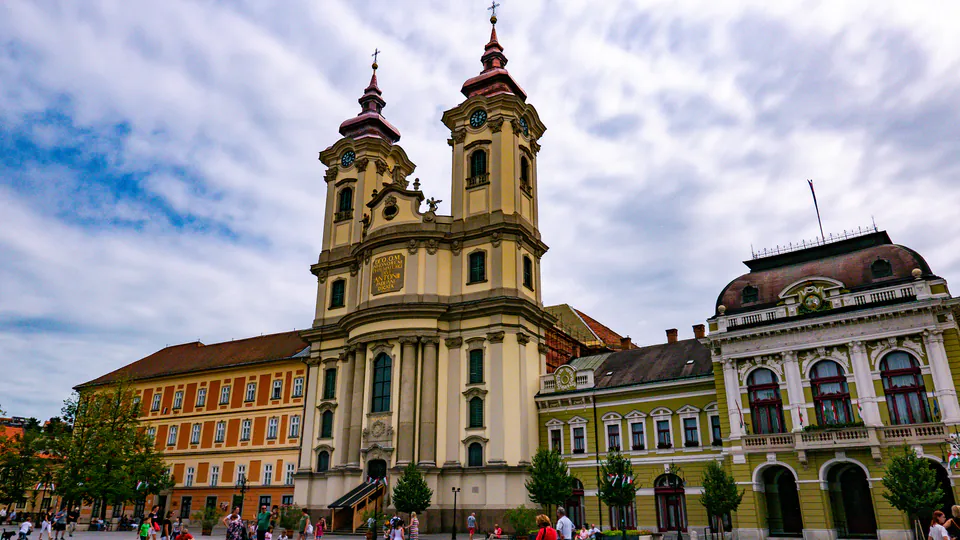
How to Get to Eger from Budapest
Getting to Eger from Budapest is really straightforward. There are a few good options depending on what you prefer and how much you want to spend. The trip is about 130 kilometers and takes you through some nice Hungarian countryside.
Train - Our Favorite Way
We always recommend taking the train because it's comfortable and you get some nice views along the way. Hungarian Railways (MÁV) runs direct trains every hour from Budapest-Keleti station, and you don't need to change trains at all.
The trip takes about 1 hour and 52 minutes, which is perfect for a day out. Tickets cost around 2,400-2,800 HUF (about $7-9 USD). You can save some money if you travel during off-peak times - that's between 9:30 AM-4:00 PM and after 7:00 PM. We usually buy tickets online through the MÁV website or their app, but you can also get them at the station.
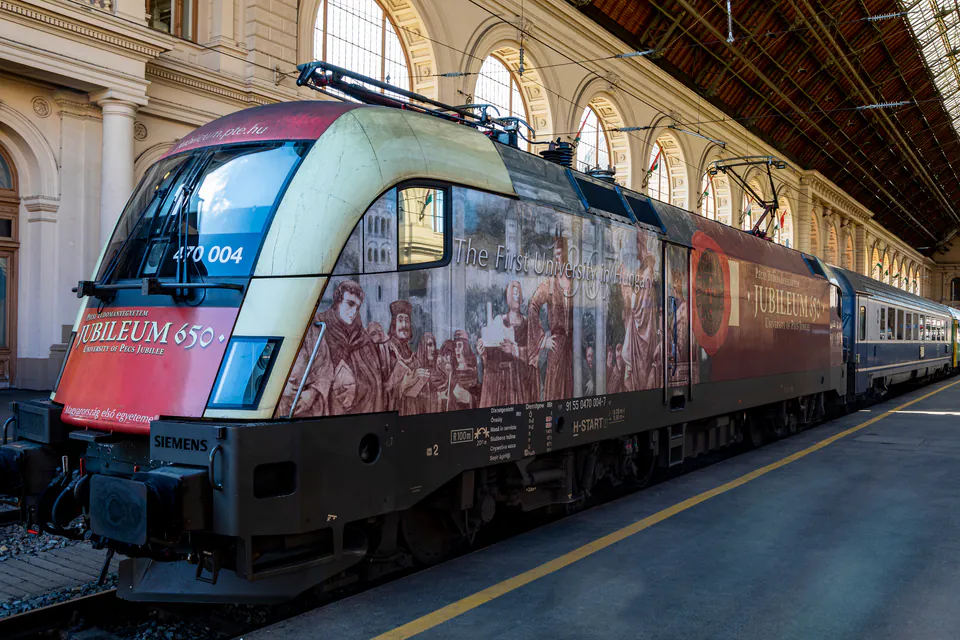
Bus - Drops You Right in the Center
Volánbusz buses run every hour from Budapest's Stadion Bus Station, which is on the M2 metro line so it's easy to reach. The journey takes about 2 hours and 6-11 minutes, and costs roughly the same as the train at 2,400-2,900 HUF.
The big advantage with the bus is that it drops you right in Eger's city center. You can literally step off and start exploring immediately. You can buy tickets online, at the station, or from the driver when you get on.
Driving - If You Want Total Freedom
If you're renting a car, driving is the fastest option at around 1 hour and 20 minutes via the M3 motorway. But here's the thing - you need to buy a mandatory e-vignette for the motorway that costs about €29 for 10 days. We learned this the hard way on our first trip! Unless you're already renting a car for other trips, it makes driving pretty expensive for just one day.
Transportation Options Comparison
| Transport | Duration | Cost (HUF) | Departure Point | Main Advantage |
|---|---|---|---|---|
| Train | 1h 52min | 2,400-2,800 | Budapest-Keleti | Comfortable & Direct |
| Bus | 2h 10min | 2,400-2,900 | Stadion Station | Central Arrival |
| Car | 1h 20min | Fuel + €29 vignette | Your Location | Fastest & Flexible |
Eger Castle - Where Hungarian Heroes Made Their Stand
You can't visit Eger without going to the castle that sits on top of the city. This place isn't just another tourist spot - it's where some serious Hungarian history went down. Back in 1552, Captain István Dobó and his small group of defenders held off a massive Ottoman army, and people still talk about it today.
We always spend at least 2-3 hours here because there's so much to see. The István Dobó Castle Museum has some really cool exhibits with old weapons, armor, and detailed stories about that famous siege. Make sure you check out the Heroes' Hall in the Gothic palace - there's this impressive marble tomb of István Dobó that's pretty moving.
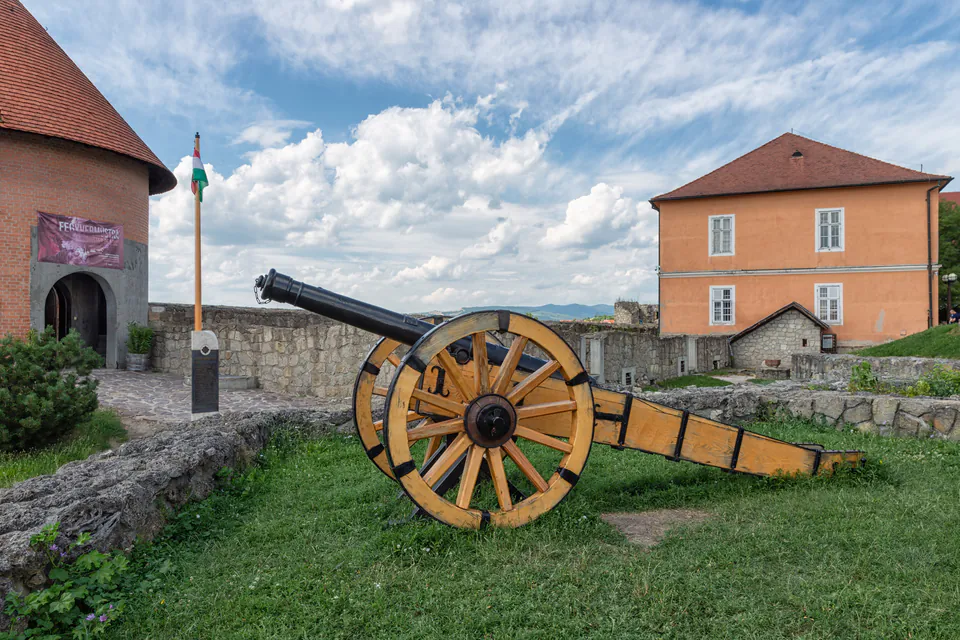
If you want amazing views over Eger and the Bükk mountains, climb up to Calvary Hill - it's the highest point in the castle. The climb is worth it because you get these incredible views of all the red rooftops and the countryside stretching out beyond.
The castle opens at 10:00 AM and closes at 6:00 PM during summer, but in winter it often closes at 4:00 PM so check ahead. Adult tickets cost 2,400 HUF, and kids and seniors get in for 1,200 HUF. Some extra stuff like the underground tours and wax museum cost more.
Beautiful Baroque Buildings Around Dobó Square
When you come down from the castle, you'll end up at Dobó István Square, which is basically the heart of Eger. It's named after that castle captain we mentioned, and there's a statue of him right in the middle. This square has some of the most beautiful Baroque buildings we've seen in Hungary.
The Minorite Church totally dominates one side of the square, and it's considered one of Hungary's best examples of Baroque church architecture. Those twin towers basically define Eger's skyline. If you go inside, the decorative details are pretty amazing.
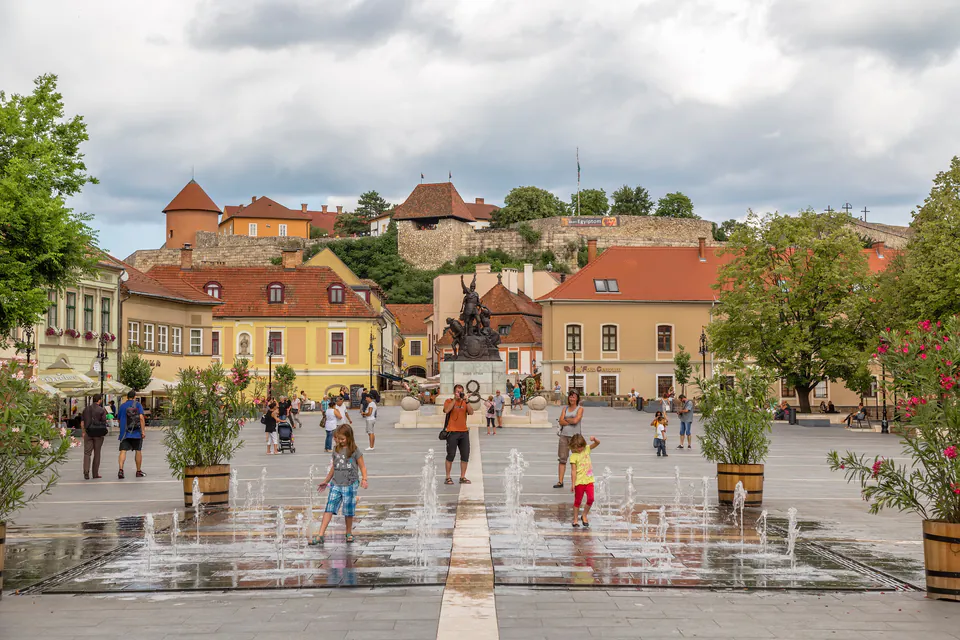
From Dobó Square, take a walk down Kossuth Lajos Street. Locals call it Eger's "Baroque Street" and you'll see why. The old townhouses and historic buildings along here are really well preserved, including this nice Franciscan Church.
Eger Basilica - Hungary's Second Biggest Church
Just a short walk from Dobó Square brings you to Eszterházy Square, where this huge Eger Basilica dominates everything around it. This massive Neoclassical building was designed by József Hild in the 1830s, and it's actually Hungary's second-largest church.
The size of this place is pretty impressive when you first see it. Inside, they have Hungary's second-largest pipe organ. The whole building has this classical style that's quite different from all the Baroque stuff you see in the rest of the city center.
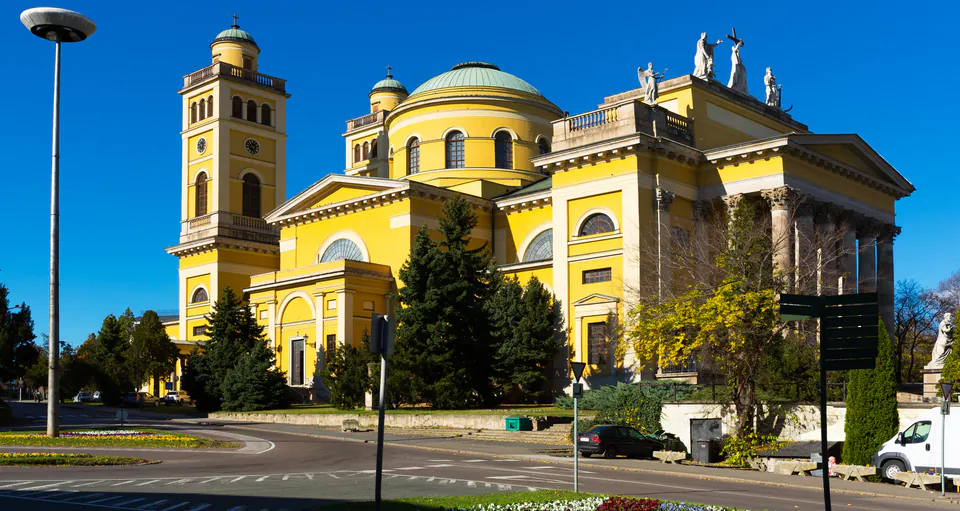
You can visit Monday through Saturday from 8:30 AM to 6:00 PM, and Sundays from 1:00 PM to 6:00 PM. It's usually free to get in, though they appreciate a small donation to help maintain the building.
The Ottoman Minaret - A Unique Survivor
There's this tall, skinny minaret that rises 40 meters above the city streets, and it's a real reminder of when the Ottomans controlled Eger for a while. This thing is actually the northernmost surviving Turkish minaret in all of Europe, dating back to the early 1600s.
If you're up for it, you can climb the narrow, winding 97 steps to the top. It's a bit of a workout, but you get these unique views over Eger's rooftops that you can't get anywhere else. There's a small entrance fee and it's definitely a different perspective of the city from this old Ottoman viewpoint.
Valley of Beautiful Women - Where the Wine Magic Happens
You absolutely have to visit Szépasszony-völgy, which translates to "Valley of Beautiful Women." It's about a 20-25 minute walk from the city center, and this is where Eger's wine culture really comes alive.
Picture this valley with around 200 individual wine cellars scattered around, many of them carved right into the soft volcanic rock hillsides. These rustic cellars create this authentic atmosphere that's totally unique in Hungary. Families have been making wine in these cool, naturally insulated spaces for generations.
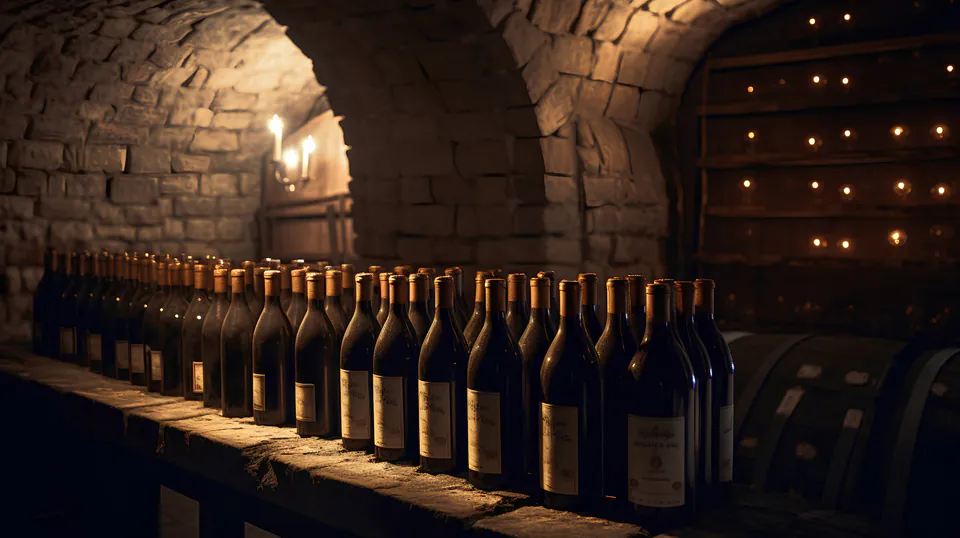
Bull's Blood Wine - The Legend You Need to Try
The star of Eger's wine scene is definitely Egri Bikavér, or Bull's Blood. This legendary dry red wine has this cool name that comes from local folklore connected to that 1552 siege - people believed the wine gave the castle defenders extra strength.
Bull's Blood is actually a blend that's traditionally built around the Kékfrankos grape. Modern rules say it needs at least three specific grape varieties from an approved list, often including international ones like Cabernet Sauvignon and Merlot mixed with traditional Hungarian grapes.
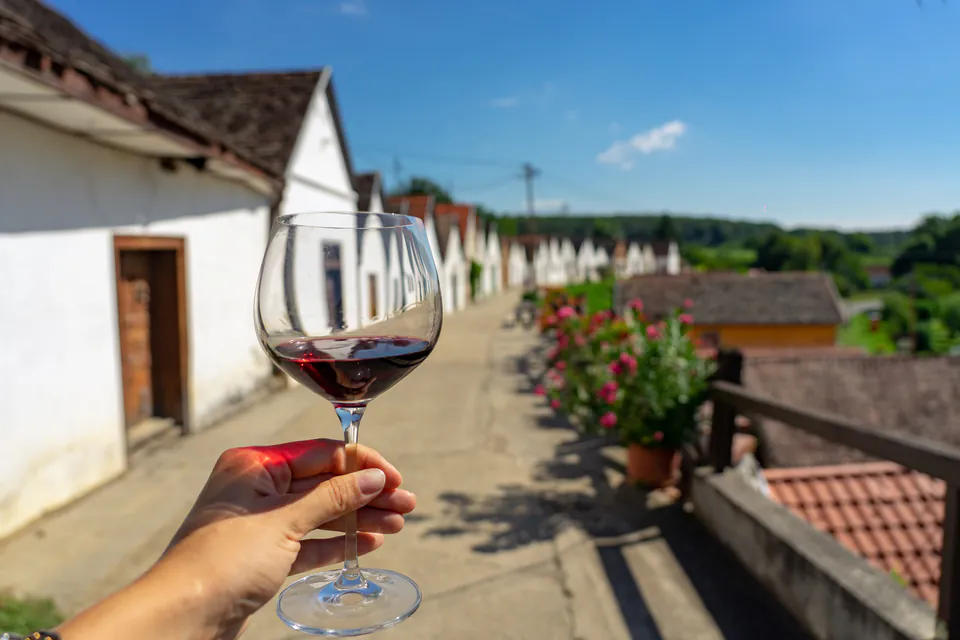
The wines range from garnet red to deep ruby colors, with rich spicy and fruity flavors that are well-balanced without being too tannic. Quality varies a lot between producers - you'll find simple everyday wines and sophisticated premium bottles that need years of aging. Look for Superior and Grand Superior labels, which mean stricter production standards and more complex wines that age well.
What the Cellar Experience is Really Like
Visiting these cellars is totally different from fancy modern tasting rooms. These rustic, often family-run places carved into cool, damp volcanic rock stay around 10-15°C year-round. They're perfect for aging wine and give you a nice break on hot days.
The cellar owners usually let you taste several wines, including different Bull's Blood versions along with other local reds like Kadarka and Portugieser, and sometimes whites or rosés. These tastings are pretty informal - often the winemakers or family members pour for you and share stories about their wines and traditions.
Things we've learned about visiting cellars:
- Bring cash - Most traditional cellars only take cash for tastings and wine purchases
- Take it easy - The pours are generous and there are lots of cellars, so pace yourself if you want to appreciate the differences
- Hit 3-4 different producers to compare styles and quality levels
- Wear good shoes for uneven paths and potentially slippery cellar steps
- Bring layers because cellars stay cool even when it's hot outside
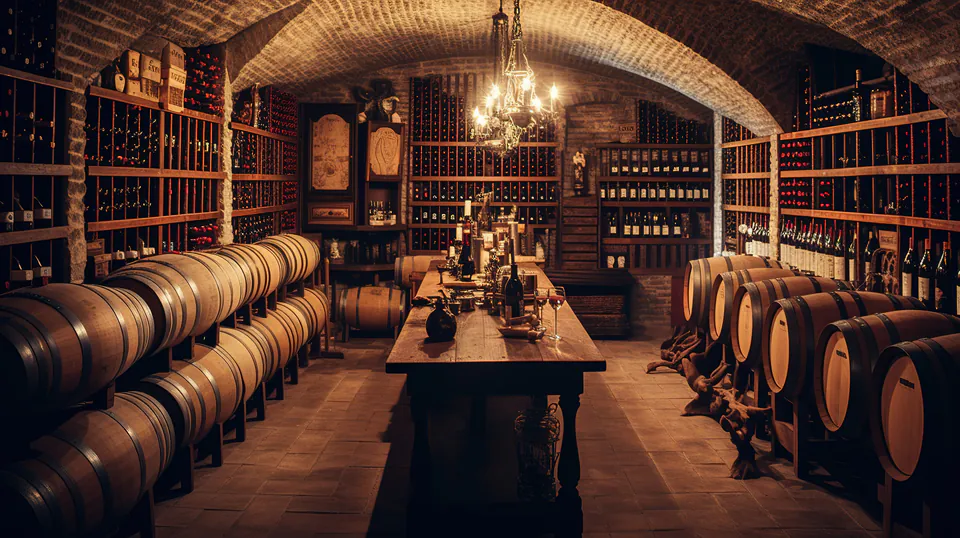
Practical Stuff for Your Eger Trip
Getting Around Once You're There
Eger's old center is pretty compact and walking is definitely the best way to see everything. The castle, Dobó Square, basilica, and minaret are all close to each other. Just make sure you wear comfortable shoes because there are lots of cobblestone streets and you'll be doing some climbing at the castle.
We always recommend wandering off the main streets too. Some of Eger's best charm is in the hidden courtyards, narrow alleys, and quiet side streets where you get to see the real character of the city without all the tourists.
Money Stuff
Hungary uses the Forint (HUF), though some tourist places might show Euro prices for reference. Make sure you have enough cash, especially for the wine cellars where most places don't take cards. There are plenty of ATMs in the city center if you need to get more Forint.
The bigger restaurants and castle ticket office usually take credit cards, but smaller places, market stalls, and most wine cellars are cash only. We always tell our bank we're traveling so our cards don't get blocked.
Safety and Common Sense
Eger is really safe with low crime rates like most smaller Hungarian cities. Just use normal tourist common sense about pickpockets in crowded areas and always carry official ID because Hungarian law requires it.
If you use taxis, make sure the meter is running or agree on a fair price first. Be careful about overcharging in some bars or restaurants by checking menu prices before you order.
Language Tips
Hungarian is the official language, but tourist areas often have English-speaking staff. Learning a few basic phrases really helps, especially in family-run wine cellars:
- Hello: Szia (informal) / Jó napot (formal)
- Thank you: Köszönöm
- Wine: Bor
- Cheers: Egészségére
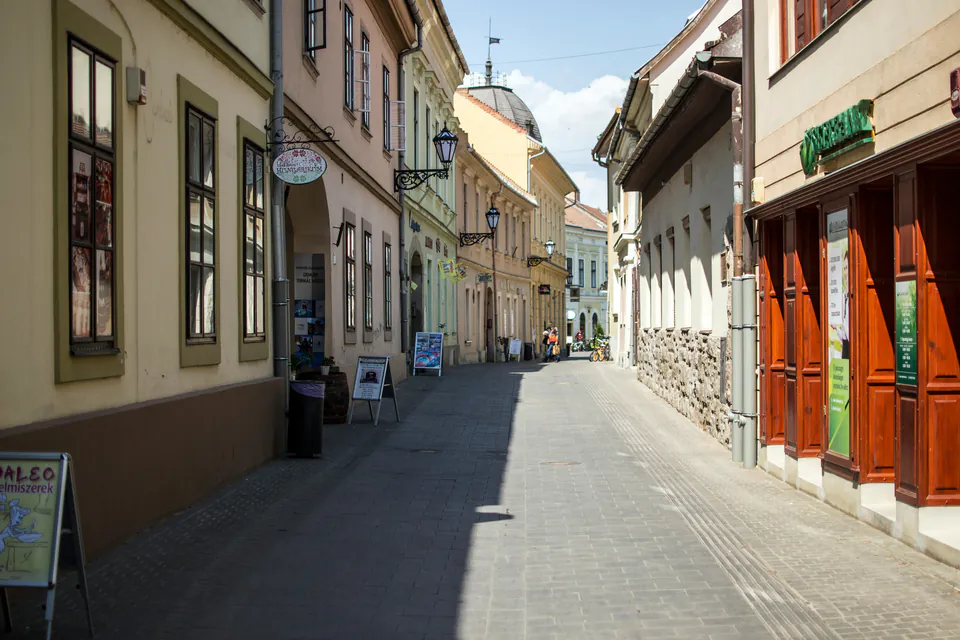
How We'd Do the Day
Morning (8:00-9:00 AM): Leave Budapest by train or bus Late Morning (10:00 AM-1:00 PM): Check out Dobó Square, Basilica, and all the beautiful Baroque buildings Lunch (1:00-2:00 PM): Get some traditional Hungarian food at a local restaurant Afternoon (2:00-4:30 PM): Spend 2-3 hours at Eger Castle and the museum Late Afternoon (4:30-6:30 PM): Head to Szépasszony-völgy for wine tasting at several cellars Evening (6:30 PM onwards): Dinner and head back to Budapest
Important reminder: Check when the last train or bus goes back to Budapest and give yourself plenty of time to get to the station. We once almost missed the last train and it would have been a real problem!